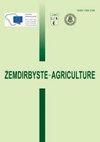利用有益微生物和深耕系统下的残留物管理量化玉米物候期
IF 0.4
4区 农林科学
Q3 AGRICULTURE, MULTIDISCIPLINARY
引用次数: 0
摘要
据推测,不同质量和掺入深度的残留物会通过分解对土壤性质的改善产生不同的作用。了解使用耕作机具和有效微生物在不同深度分解残留物的反应有助于制定改善土壤性质的策略。因此,在三种不同的耕作机具(耕作机 (CT)、模板犁 (MBP) 和无残留 (R0) 作对照的情况下,使用三种氮(N)补充作物残留:小麦 (Rw)、鹰嘴豆 (Rc)、Rw + Rc 和无残留 (R0)本文章由计算机程序翻译,如有差异,请以英文原文为准。
Quantifying maize phenology using beneficial microorganisms and residue management under deep tillage system
Residues differing in quality and incorporation depths are presumed to contribute differently to the improvement of soil properties through decomposition. Understanding the response of residue decomposition at different depths using tillage implements and effective microorganisms can help to develop strategies for improving soil properties. Therefore, three nitrogen (N) supplemented crop residues: wheat (Rw), chickpea (Rc), Rw + Rc, and no residue (R0) as a control, under three different tillage implements: cultivator (CT), mouldboard plough (MBP)
求助全文
通过发布文献求助,成功后即可免费获取论文全文。
去求助
来源期刊

Zemdirbyste-agriculture
AGRICULTURE, MULTIDISCIPLINARY-
CiteScore
1.80
自引率
11.10%
发文量
36
审稿时长
>12 weeks
期刊介绍:
Zemdirbyste-Agriculture is a quarterly scientific journal which covers a wide range of topics in the field of agricultural sciences, agronomy. It publishes articles of original research findings in the English language in the field of agronomy (soil and crop management, crop production, plant protection, plant breeding and genetics, biotechnology, plant nutrition, agrochemistry, soil science, microbiology etc.) and related areas. Articles are peer-reviewed. Review, debating papers as well as those of a methodological nature will also be considered.
 求助内容:
求助内容: 应助结果提醒方式:
应助结果提醒方式:


